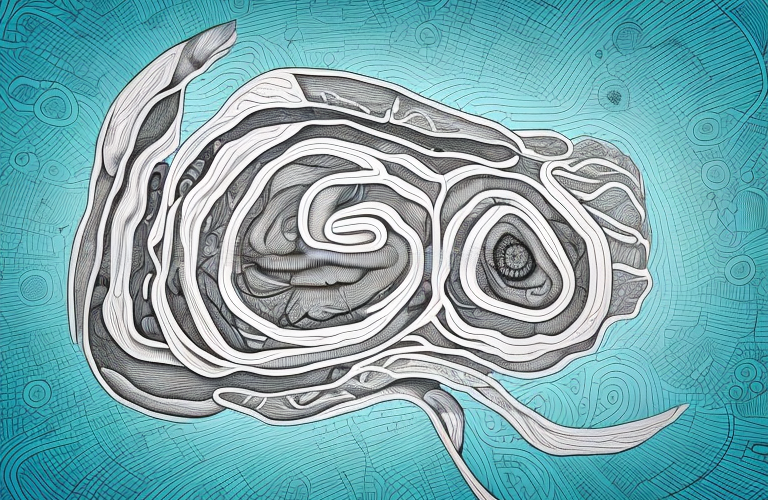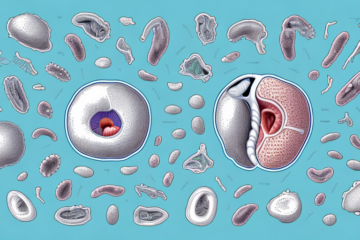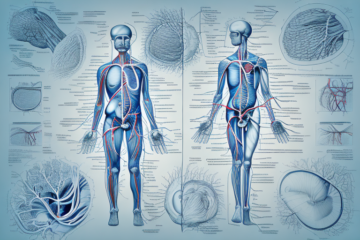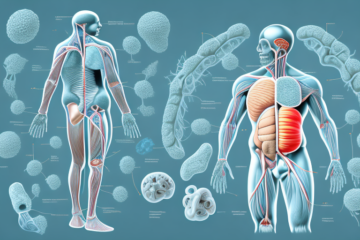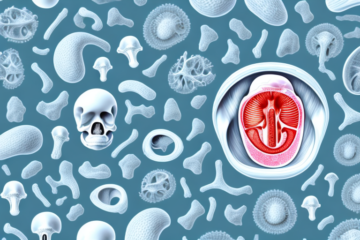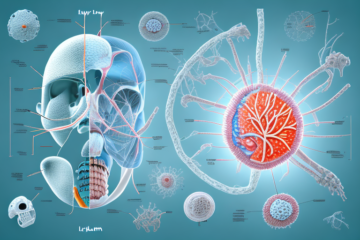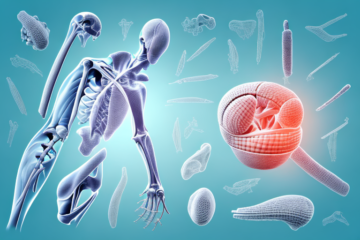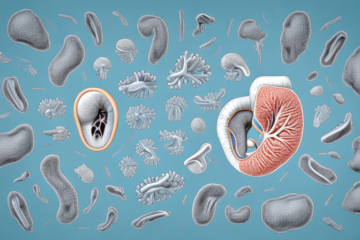The colon, also known as the large intestine, plays a crucial role in the digestive system. From absorbing nutrients to removing waste products, this organ contributes to our overall health and well-being in numerous ways. In this comprehensive article, we’ll explore the different aspects of the colon, from its anatomy to its multiple functions, health issues, risk factors, treatment options, and prevention strategies. So let’s dive in and learn more about the colon and how to maintain its health.
What is the colon? Understanding the basics
The colon is a muscular tube that starts at the end of the small intestine and ends at the anus. It’s about 5 feet long and divided into four main parts: the ascending colon, transverse colon, descending colon, and sigmoid colon. The colon is responsible for absorbing water and electrolytes from undigested food, producing mucus to lubricate the feces, and storing waste products until they can be eliminated from the body through bowel movements.
There are several common conditions that can affect the colon, including irritable bowel syndrome (IBS), inflammatory bowel disease (IBD), and colon cancer. IBS is a chronic condition that affects the large intestine and can cause symptoms such as abdominal pain, bloating, and changes in bowel habits. IBD is a group of inflammatory conditions that affect the digestive tract, including the colon, and can cause symptoms such as diarrhea, abdominal pain, and rectal bleeding. Colon cancer is a type of cancer that starts in the colon or rectum and can cause symptoms such as changes in bowel habits, blood in the stool, and abdominal pain.
To maintain a healthy colon, it’s important to eat a balanced diet that includes plenty of fiber, drink plenty of water, and exercise regularly. It’s also important to get regular screenings for colon cancer, especially if you have a family history of the disease or are over the age of 50. Screening tests can help detect colon cancer early, when it’s most treatable.
The anatomy of the colon: A detailed overview
The colon has numerous layers, including the mucosa, submucosa, muscularis propria, and serosa. The mucosa is the innermost layer, responsible for absorbing nutrients from food and secreting mucus to protect the intestinal walls. The submucosa contains blood vessels, lymphatic tissue, and nerves that coordinate the digestive process. The muscularis propria is a layer of smooth muscle that contracts to move the food and waste products along the colon, while the serosa covers the outer surface of the colon and prevents friction and injury.
It is important to note that the colon plays a crucial role in the body’s immune system. The lymphatic tissue found in the submucosa layer contains white blood cells that help fight off infections and diseases. Additionally, the colon is home to trillions of bacteria that make up the gut microbiome, which also plays a vital role in immune function and overall health.
Various factors can affect the health of the colon, including diet, lifestyle, and genetics. A diet high in fiber and low in processed foods can promote healthy digestion and reduce the risk of colon cancer. Regular exercise and avoiding smoking and excessive alcohol consumption can also help maintain colon health. It is important to schedule regular colonoscopies to detect any potential issues early on.
The role of the colon in digestion and nutrient absorption
The colon is responsible for absorbing water, electrolytes, and vitamins from the undigested food that reaches it from the small intestine. The bacteria in the colon also produce certain nutrients such as vitamin K and some B vitamins. Seafood, meat, and dairy products are good sources of these essential vitamins.
In addition to its role in nutrient absorption, the colon also plays a crucial role in the elimination of waste from the body. As the undigested food moves through the colon, it forms into feces, which are then eliminated through the rectum and anus. The colon also helps to maintain the body’s fluid and electrolyte balance by absorbing excess water and electrolytes from the feces before elimination.
How does the colon work with other organs in the digestive system?
The colon works in tandem with other organs in the digestive system such as the liver, pancreas, and gallbladder. The liver produces bile, which helps digest fats in the small intestine, while the pancreas secretes enzymes that break down carbohydrates, proteins, and fats. The gallbladder stores and releases bile into the small intestine as needed.
In addition to these organs, the small intestine also plays a crucial role in the digestive process. It is responsible for absorbing nutrients from the food that has been broken down by the stomach and small intestine. The colon then absorbs water and electrolytes from the remaining waste, forming solid feces that are eventually eliminated from the body.
It is important to maintain a healthy digestive system by eating a balanced diet, drinking plenty of water, and exercising regularly. Certain foods, such as fiber-rich fruits and vegetables, can help promote regular bowel movements and prevent constipation. Additionally, probiotics found in foods like yogurt and kefir can help maintain a healthy balance of bacteria in the gut.
Common health issues related to the colon
There are several health issues that can affect the colon, such as inflammatory bowel disease, irritable bowel syndrome, constipation, diarrhea, diverticulosis, diverticulitis, hemorrhoids, and colon cancer. These conditions can cause discomfort, pain, bleeding, and other symptoms that can affect an individual’s quality of life and overall health.
It is important to maintain a healthy colon by eating a balanced diet rich in fiber, drinking plenty of water, and exercising regularly. Regular screenings for colon cancer are also recommended for individuals over the age of 50 or those with a family history of the disease. Early detection and treatment of colon issues can greatly improve outcomes and prevent more serious health complications.
Risk factors and signs of a colon-related problem
There are several risk factors that can increase the likelihood of developing a colon-related problem, such as a family history of colon cancer, a diet high in red meat and fat, a sedentary lifestyle, and smoking. Some common signs of a colon-related problem include abdominal pain or cramping, bloating, constipation, diarrhea, rectal bleeding, and weight loss.
It is important to note that age is also a significant risk factor for colon-related problems. Individuals over the age of 50 are at a higher risk of developing colon cancer and should undergo regular screenings. Additionally, certain medical conditions such as inflammatory bowel disease and diabetes can also increase the risk of colon-related problems.
Prevention is key when it comes to colon health. Maintaining a healthy diet rich in fiber, staying physically active, and avoiding smoking can all help reduce the risk of developing colon-related problems. It is also important to pay attention to any changes in bowel habits or symptoms and to seek medical attention if any concerns arise.
Screening tests for evaluating colon health
Screening tests are essential for detecting colon cancer or other problems early. Some common screening tests include colonoscopies, fecal occult blood tests, CT colonography, and flexible sigmoidoscopy. These tests can help detect colon-related problems before they become more serious or life-threatening.
Colonoscopies are considered the gold standard for colon cancer screening. During this procedure, a doctor uses a long, flexible tube with a camera to examine the entire colon and rectum. If any abnormal growths or polyps are found, they can be removed during the procedure to prevent them from developing into cancer.
Fecal occult blood tests are another common screening method. This test checks for the presence of blood in the stool, which can be a sign of colon cancer or other problems. While this test is less invasive than a colonoscopy, it may not detect all cases of colon cancer and may need to be repeated more frequently.
Diet and lifestyle changes for a healthy colon
Maintaining a healthy diet rich in fiber, fruits, vegetables, and whole grains can help reduce the risk of colon-related problems. Drinking plenty of water and exercising regularly can also promote bowel regularity and overall colon health. Quitting smoking and reducing alcohol consumption can also contribute to better colon health.
In addition to diet and lifestyle changes, regular screening for colon cancer is also important for maintaining colon health. Screening tests such as colonoscopies can detect precancerous polyps and allow for early intervention and treatment.
It is also important to be aware of any changes in bowel habits or symptoms such as abdominal pain, rectal bleeding, or unexplained weight loss. These could be signs of a more serious colon-related issue and should be discussed with a healthcare provider.
Medical interventions for managing colon diseases
If an individual is diagnosed with a colon-related problem, medical interventions may be necessary. Depending on the condition, treatment options may include antibiotics, probiotics, laxatives, enemas, surgery, or chemotherapy.
It is important to note that medical interventions should always be prescribed and monitored by a healthcare professional. In addition to medical treatments, lifestyle changes such as a healthy diet, regular exercise, and stress management may also be recommended to manage colon diseases. It is important to follow the recommended treatment plan and attend regular check-ups to ensure the best possible outcome.
Colon cancer: Symptoms, diagnosis and treatment options
Colon cancer is a common type of cancer that affects the colon and rectum. Symptoms of colon cancer include rectal bleeding, changes in bowel habits, abdominal pain, and unexplained weight loss. Diagnosis may involve a colonoscopy, biopsy, or imaging tests such as CT scan or MRI. Treatment options for colon cancer may include surgery, chemotherapy, radiation therapy, or a combination of these therapies.
It is important to note that early detection of colon cancer can greatly improve the chances of successful treatment. Regular screenings, such as colonoscopies, are recommended for individuals over the age of 50 or those with a family history of colon cancer. Lifestyle changes, such as maintaining a healthy diet and exercise routine, may also help reduce the risk of developing colon cancer.
Additionally, there are several support groups and resources available for individuals and families affected by colon cancer. These resources can provide emotional support, education, and practical assistance throughout the cancer journey. It is important for those affected by colon cancer to seek out these resources and connect with others who have gone through similar experiences.
Preventing colon cancer: Tips and strategies for reducing your risk
There are several strategies that can help reduce the risk of colon cancer, such as maintaining a healthy weight, staying physically active, eating a healthy diet, avoiding smoking and excessive alcohol consumption, and getting regular colonoscopies or other screening tests as recommended by your healthcare provider.
In addition to these strategies, studies have shown that increasing your intake of fiber-rich foods, such as fruits, vegetables, and whole grains, can also help lower your risk of colon cancer. Fiber helps to keep your digestive system healthy and can prevent the development of polyps in the colon, which can lead to cancer over time. So, be sure to include plenty of fiber in your diet to help protect against colon cancer.
Alternative therapies for promoting colon health
Alternative therapies such as acupuncture, herbal supplements, and probiotics have been suggested to promote colon health. However, it’s important to consult with a healthcare provider before using any alternative therapy as there may be potential risks or interactions with other medications.
Acupuncture is a traditional Chinese medicine practice that involves inserting thin needles into specific points on the body to stimulate energy flow and promote healing. Some studies have suggested that acupuncture may help alleviate symptoms of irritable bowel syndrome (IBS), a common condition that affects the colon. However, more research is needed to determine the effectiveness of acupuncture for colon health.
Herbal supplements, such as aloe vera, psyllium husk, and slippery elm, have also been suggested to promote colon health. Aloe vera has anti-inflammatory properties and may help soothe the lining of the colon, while psyllium husk and slippery elm are high in fiber and may help regulate bowel movements. However, it’s important to note that herbal supplements can interact with other medications and may not be safe for everyone. It’s best to consult with a healthcare provider before taking any herbal supplements for colon health.
Latest research and advancements in colon health
Research on colon health is ongoing, and several new treatments and diagnostic tools are being developed to improve colon cancer screening, diagnosis, and treatment. These advancements may include new drugs, genetic testing, imaging techniques, and minimally invasive surgical procedures.
One promising area of research is the use of immunotherapy for colon cancer treatment. This approach involves using the body’s own immune system to target and destroy cancer cells. Early studies have shown promising results, and researchers are continuing to explore this approach.
Another area of focus is the role of diet and lifestyle in colon health. Studies have shown that a diet high in fiber and low in red and processed meats can reduce the risk of colon cancer. Additionally, regular exercise and maintaining a healthy weight can also lower the risk of developing colon cancer.
Frequently asked questions about the colon
Some common questions about the colon include whether it’s normal to have changes in bowel habits, whether colon cleanses are beneficial, and what foods are good for colon health. It’s important to consult with a healthcare provider to get personalized answers to these and other questions related to the colon.
Overall, the colon plays a critical role in our digestive system and overall health. Understanding the basics of its anatomy and function, as well as knowing how to prevent and manage colon-related problems, can help individuals maintain optimal colon health and lead a healthier life.
One way to maintain a healthy colon is to consume a diet rich in fiber. Fiber helps to promote regular bowel movements and can also reduce the risk of colon cancer. Some good sources of fiber include fruits, vegetables, whole grains, and legumes.
In addition to a healthy diet, regular exercise can also benefit colon health. Exercise helps to stimulate the digestive system and can reduce the risk of constipation. It’s recommended to aim for at least 30 minutes of moderate exercise most days of the week.

